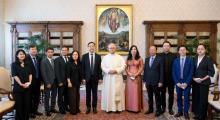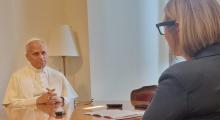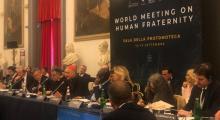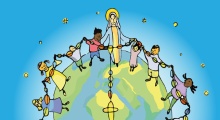Issued by the Catholic Center for Studies and Media - Jordan. Editor-in-chief Fr. Rif'at Bader - موقع أبونا abouna.org
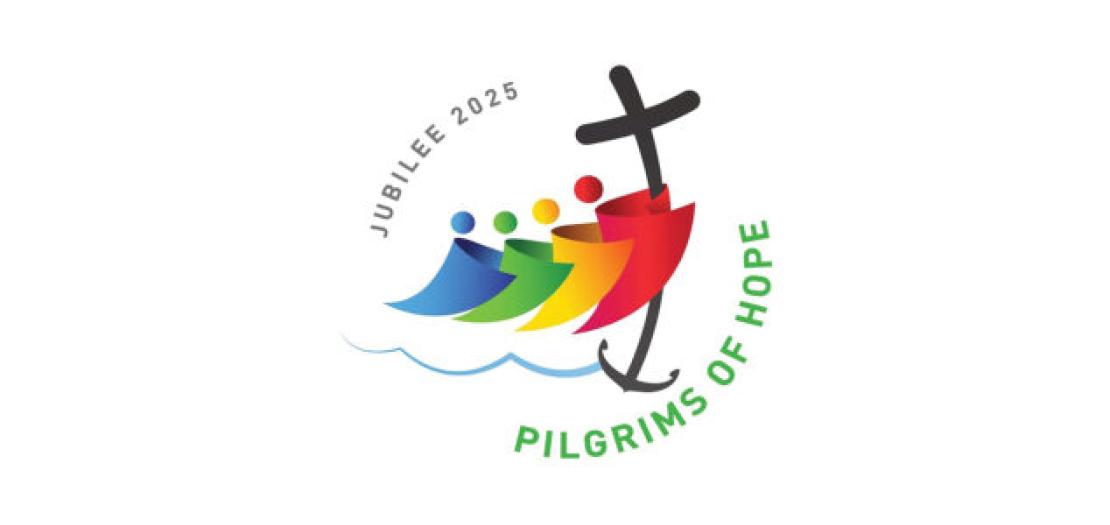
The secretary generals of three major Catholic organizations -- Pax Christi International, Caritas Internationalis, and CIDSE - have published a statement in preparation for the UN's climate change conference, COP30, to be held in Brazil from November 10-21.
"We unite our voices," the organizations said, "to affirm a simple yet urgent truth: there can be no true peace without climate justice, and no climate justice without peace. The interwoven crises of ecological collapse, a fragmenting global order and unrelenting extreme poverty are not parallel problems-they are entangled threads of a shared global threat."
The statement was released during a September 8 webinar sponsored by Scottish Catholic International Aid Fund (SCIAF). Use this link to watch the webinar on YouTube.
Following is the full statement:
As representatives of global Catholic networks committed to peace, justice, and care for creation, we unite our voices ahead of COP30 in Belém, Brazil, to affirm a simple yet urgent truth: there can be no true peace without climate justice, and no climate justice without peace.
The interwoven crises of ecological collapse, a fragmenting global order and unrelenting extreme poverty are not parallel problems-they are entangled threads of a shared global threat. We are not simply facing a crisis of greenhouse gas emissions, of a confluence of border conflicts or regional poverty cycles. We are facing a convergence of mass suffering now and risks of future harm, perpetuated by a political and economic system that is at risk of coming completely undone. The state we're in is "a consequence of the collective refusal to think about future generations", (Laudato Si' 159) greed (LS9), shortsightedness (LS32) and which to solve needs "a new and universal solidarity. (LS14) Without action now, the interwoven crises the planet faces will continue to perpetuate one, and could take the planet towards its darkest hour unless there is a change of course.
Climate change is already exacerbating conflicts across the world, and this is a dangerous trend expected to intensify as the global temperatures continue to rise. The increasing frequency and severity of extreme events coupled with shifting resource availability and the rendering of land uninhabitable will lead to mass forced displacement of people. This in turn, risks further destabilizing vulnerable regions and exacerbating existing tensions. In this context, climate action is not only an environmental imperative, but also a vital component of global peacebuilding.
The converging crises of climate change and global security are not only linked, but also born of the same short-sightedness, immorality and flawed logic. For decades, the pursuit of profit over people has shaped global systems, placing power in the hands of those who benefit from destruction and division. The fossil fuel, the arms and financial industries, driven by enormous profit motives, have exerted disproportionate influence over politics, distorting democratic processes and obstructing efforts for climate justice and peaceful resolution. These industries thrive on instability, inequality, relentless extraction and oligarchic cronyism - leaving behind scorched land, broken communities, and a wounded world.
Today, we are facing common challenges that stem from a shared root. A global system increasingly shaped by short-term political interests, and concentrated power. Decision making is dominated by a few nations and private actors, distant from the communities most affected by conflict and climate change. The founding vision of post-war multilateralism, where every country - large or small - had a voice in shaping peace and progress, is being forgotten. Yet true multilateralism, like nature itself, depends on balance: just as every species has its role in the ecosystem, so too does every nation have equal value and voice in the global order. The shift toward a "multi-polar" world where "might makes right" threatens not only the hope of a peaceful future, but also our collective ability to address the climate crisis. Multilateralism demands much from powerful nations - above all, the courage to cede power for the common good.
But just as these crises are rooted in the same logic, they can be overcome through shared values. The path forward must be grounded in the solidarity of peoples, the common good of our shared home, and the principle of subsidiarity - ensuring that decisions are made as closely as possible to those most affected. Above all, we must uphold the preferential option for the poor, ensuring that those who are most vulnerable are first in line for support, but empowered to lead. Translating these values into action means reimagining our global systems, reforming international financial institutions, ending fossil fuel subsidies, and prioritizing community-led solutions in climate and peacebuilding strategies. It means centering Indigenous knowledge and their right to live in harmony with their land, promoting debt justice, reducing the exorbitant military budgets and ensuring inclusive representation at decision-making tables, from the UN to local councils. The moral imperative is clear but the tools are within reach. These timeless principles from Catholic Social Teaching offer not only moral clarity, but practical guidance for building a world that is both peaceful and sustainable.
Pope Leo XIV reminds us that nonviolence, both as a method and a style, provides the foundation for how we confront the challenges of our time. In this light, active nonviolence becomes a powerful response to the crises we face. Communities peacefully resisting deforestation, opposing extractive industries, and advocating for sustainable development are doing so through nonviolent means-organizing, legal action, and international solidarity. These efforts, rooted in justice and respect for human dignity, are essential to the transformation we seek. We pray our leaders remember this spirit of nonviolence in their deliberations, remember the horrors of war, and try again to put the nonviolent pursuit of peace at the heart of their diplomatic engagements, knowing that the future of the planet depends on it.
Today we are raising our voices to join with Pope Leo, other faith leaders and people of good will in chorus calling to halt the march towards war, reverse course, renew our passion for peace and believe again that a peaceful world is possible; a green world is possible; a better world is possible.
Alistair Dutton
Caritas Internationalis
Josianne Gauthier
CIDSE
Martha Inés Romero
Pax Christi International


